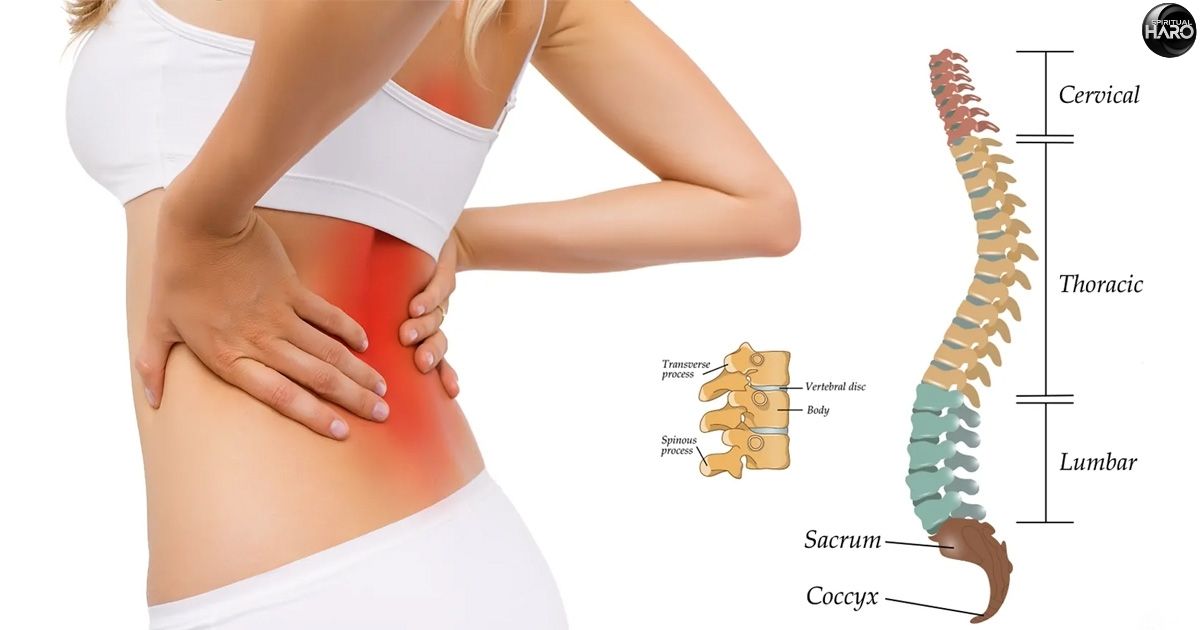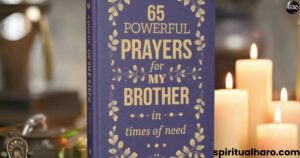Low back pain can be a debilitating experience, affecting not only your physical health but also your emotional and spiritual well-being. Many people are surprised to learn that their discomfort may have deeper meanings connected to their inner struggles.
Understanding these spiritual implications can provide valuable insights into the root causes of pain, leading to healing and empowerment. In this article, we delve into the 13 shocking spiritual meanings of low back pain, exploring how stress, fear, and other emotions manifest in this area of the body.
From anxiety to resentment, each pain point can tell a story that reveals underlying issues in your life. By recognizing these spiritual meanings, you can embark on a journey toward holistic healing, addressing both the physical and emotional aspects of your discomfort.
Read on to uncover the spiritual insights hidden within your low back pain and learn how to transform your experience into an opportunity for growth and self-discovery.
Low Back Pain Spiritual Meaning

The spiritual meaning of low back pain is often rooted in emotional turmoil. This part of the body is intricately connected to our feelings of stability, security, and support. When experiencing low back pain,
it can signify that you are grappling with stressors in your life that undermine these essential aspects. Pain can act as a signal from your body, urging you to address unresolved issues or emotional baggage.
Many people overlook the profound impact emotions can have on their physical health. Low back pain can emerge as a manifestation of feelings like fear, grief, and anxiety. Recognizing these emotions is the first step toward healing. Instead of simply treating the pain, it’s crucial to explore its spiritual significance.
1. Stress
Stress is one of the primary culprits behind low back pain, manifesting physically when we feel overwhelmed. The pressures of daily life, work, and relationships can create a heavy burden on our minds and bodies. This burden often settles in the lower back, where we carry our feelings of instability.
When stress levels rise, our bodies react by tightening muscles and causing discomfort. Recognizing this connection can empower you to manage stress more effectively, leading to reduced pain and improved well-being.
To alleviate stress-related low back pain, it’s essential to incorporate stress-relief techniques into your daily routine. Practices like mindfulness, yoga, and meditation can help calm the mind and release tension in the body. Additionally, seeking support from friends, family, or professionals can provide a sense of stability during challenging times.
2. Fear
Fear can be a significant contributor to low back pain, as it creates tension in our bodies and minds. When we live in fear, we often brace ourselves, leading to tightness in the lower back. This protective response can result in pain and discomfort over time.
Whether the fear stems from personal challenges, health concerns, or external pressures, it can manifest physically in the lower back, creating a cycle of discomfort and anxiety.To break this cycle, it’s crucial to confront the fears that are impacting your life.
Engaging in self-reflection and seeking support from trusted individuals can help you address and overcome these fears. Techniques such as journaling, therapy, or guided meditation can also facilitate a deeper understanding of your fears, allowing you to release the tension they create.
3. Grief
Grief is another emotional factor closely linked to low back pain. When we experience loss or disappointment, it can weigh heavily on our emotional state, often reflecting in our bodies. The lower back is particularly sensitive to feelings of grief, as we may feel unsupported during difficult times.
This emotional pain can transform into physical discomfort, signaling the need for healing and processing of the grief. Addressing grief requires compassion and patience with yourself. Allowing yourself to feel and express your emotions is vital for healing.
Engaging in activities such as art, writing, or talking with a supportive friend can provide an outlet for your feelings. Seeking professional help, such as therapy or support groups, can also aid in navigating the grieving process. By honoring your grief, you can release its hold on your lower back and embrace the healing journey.
4. Guilt
Guilt can manifest as low back pain, especially when we carry the burden of unresolved feelings or actions. This emotional weight can create tension in the lower back, leading to discomfort. The feelings of guilt can stem from various sources, such as past mistakes, unfulfilled responsibilities, or interpersonal conflicts.
Acknowledging and processing these emotions is crucial for alleviating the associated pain.To address guilt, it’s important to practice self-forgiveness and compassion. Reflecting on the circumstances that led to your feelings of guilt can provide valuable insights and help you release the burden.
Engaging in practices like journaling, meditation, or even talking to a trusted friend can facilitate this process. By allowing yourself to let go of guilt, you can alleviate its physical manifestations in your lower back and create space for healing and growth.
5. Anxiety
Anxiety is a common emotional state that can significantly impact the body, including the lower back. When anxious, our bodies tend to tense up, leading to muscle tightness and discomfort in the back area. This connection between anxiety and low back pain highlights the importance of managing anxiety for overall health.
Recognizing anxiety as a contributing factor can empower individuals to seek solutions that address both their emotional and physical discomfort. To combat anxiety-related low back pain, it’s essential to incorporate relaxation techniques into your routine.
Mindfulness practices, deep breathing exercises, and physical activity can help reduce anxiety and relieve tension in the body. Additionally, establishing a supportive network of friends or professionals can provide valuable resources for coping with anxiety.
By addressing anxiety proactively, you can create a healthier mind-body connection and alleviate its physical symptoms.
6. Anger
Anger is another emotion that can manifest as low back pain. When we suppress our anger or feel powerless in situations, it can create tension in the lower back. This emotional turmoil can lead to physical discomfort, reflecting the unresolved anger we carry within.
Understanding this connection can help individuals address their anger in healthier ways, ultimately reducing pain and promoting healing. To manage anger, it’s crucial to express it constructively. Engaging in physical activities, such as exercise or creative outlets, can help release pent-up emotions
Practicing assertive communication and setting boundaries can also empower you to address situations that provoke anger. By acknowledging and expressing anger in healthy ways, you can alleviate its hold on your lower back and foster emotional well-being.
7. Insecurity
Feelings of insecurity can contribute to low back pain, as they often manifest as a lack of support or stability in one’s life. When we feel insecure, we may unconsciously tense our lower back, leading to discomfort.
This connection highlights the importance of addressing feelings of insecurity to improve overall well-being and alleviate pain. To combat insecurity, it’s important to build a strong sense of self-worth and confidence. Engaging in self-care practices, setting achievable goals, and surrounding yourself with supportive individuals can help cultivate a positive self-image Father more, reflecting on the sources of insecurity and working through them can lead to personal growth. By addressing these feelings, you can relieve the physical manifestations of insecurity in your lower back and create a more stable foundation for your life.
8. Overburden
Feeling overburdened by responsibilities or expectations can lead to low back pain. When we take on too much without adequate support, it can create a sense of heaviness that translates into physical discomfort.
This emotional burden often resides in the lower back, signaling the need to reevaluate our commitments and find balance in our lives. To alleviate the pain associated with feeling overburdened, it’s essential to prioritize self-care and set healthy boundaries.
Delegating tasks, learning to say no, and allowing yourself time for rest and rejuvenation can help lighten the load. Engaging in relaxation techniques, such as yoga or meditation, can also promote a sense of calm and ease in the body. By addressing the sources of overwhelm, you can relieve its impact on your lower back and foster a healthier, more balanced life.
9. Resentment
Resentment is a powerful emotion that can manifest as low back pain, particularly when we feel wronged or unacknowledged. Holding onto feelings of resentment can create tension and discomfort in the lower back, reflecting the emotional burden we carry.
Recognizing the impact of resentment on your well-being is crucial for healing and transformation. To address resentment, it’s essential to engage in practices that promote forgiveness and release.
Reflecting on the situation that sparked resentment and considering the lessons learned can facilitate healing. Engaging in open communication with those involved, when appropriate, can also provide an opportunity for resolution. By letting go of resentment, you can alleviate its physical manifestations in your lower back and foster emotional healing.
10. Frustration
Frustration often arises from feeling stuck or unable to achieve our goals. This emotion can create tension in the body, particularly in the lower back, as we grapple with our unmet desires.
To alleviate frustration-related low back pain, it’s important to identify the sources of your frustration and take proactive steps to address them. To address resentment, it’s essential to engage in practices that promote forgiveness and release.
Setting realistic goals, practicing patience, and seeking support from others can help create a sense of progress. Engaging in physical activities or hobbies that bring joy can also help release frustration. By actively working through frustration, you can reduce its impact on your lower back and cultivate a more lower Back Pain Biblical Meaning.
In biblical terms, low back pain is often seen as a physical manifestation of spiritual unrest or disobedience. The Bible teaches that our bodies are temples, and when we experience pain, it can serve as a reminder to seek spiritual alignment and healing.
The lower back may symbolize a lack of support or reliance on God during challenging times, urging individuals to reconnect with their faith. Recognizing the biblical significance of low back pain can lead to spiritual introspection and growth. Prayer, meditation,
and reflection on scripture can provide guidance and comfort during times of discomfort. By seeking a deeper understanding of the spiritual implications of pain, individuals can embark on a journey of healing that encompasses both the physical and spiritual realms.
11. Anxiety
Anxiety often manifests physically, leading to muscle tightness in the lower back. This tension can create a cycle of pain and heightened anxiety, making it challenging to find relief.
:Recognizing anxiety as a contributing factor to back pain encourages individuals to explore their mental health. Understanding triggers and responses can empower people to address their anxiety more effectively.
Incorporating relaxation techniques, such as deep breathing, yoga, and therapy, can significantly alleviate anxiety and its physical manifestations, leading to better pain management.
12. Resentment
Holding onto resentment can weigh heavily on both emotional and physical health. This unresolved anger can create tension in the lower back, leading to chronic pain as the body reacts to emotional strain.
Addressing feelings of resentment through forgiveness can be transformative. Engaging in reflective practices helps individuals process their emotions and ultimately frees them from the physical manifestations of resentment.
Letting go of resentment not only alleviates physical pain but also fosters emotional healing. This empowerment can lead to healthier relationships and a more positive outlook on life.
13. Insecurity
Insecurity often translates into feelings of instability or lack of support, which can physically manifest as lower back pain. When individuals feel unsupported, it creates tension that may affect their physical health.
Addressing feelings of insecurity requires building self-esteem and confidence. Engaging in self-care, setting personal boundaries, and surrounding oneself with supportive people can help strengthen emotional well-being.
By actively working on overcoming insecurity, individuals can alleviate the associated physical symptoms in their lower back, leading to greater emotional resilience and a more fulfilling life.
What Does Lower Back Pain Represent

Lower back pain represents more than just a physical ailment; it often signifies unresolved emotional and spiritual issues. This pain can serve as a wake-up call, prompting individuals to address the underlying factors contributing to their discomfort.
By exploring the emotional and spiritual significance of low back pain, individuals can gain valuable insights into their lives and embark on a journey toward holistic healing. Understanding what lower back pain represents encourages individuals to take a proactive approach to their health.
Rather than solely focusing on symptom relief, recognizing the deeper meanings can lead to transformative healing experiences. By addressing emotional and spiritual factors, individuals can create a more comprehensive wellness plan that fosters both physical and emotional well-being.
Related Guide:
8 Informative Boxelder Bugs Spiritual Meaning
Lower Spine Pain Symptoms

Lower spine pain symptoms can vary widely, encompassing sensations such as aching, stiffness, or sharp discomfort. These symptoms can indicate underlying emotional and spiritual issues that need addressing.
Recognizing the connection between physical symptoms and emotional states can provide valuable insights into the healing process.
Common symptoms of lower spine pain may include difficulty bending or lifting, muscle spasms, and radiating pain into the legs. It’s important to consider these symptoms as signals from the body, urging individuals to explore their emotional and spiritual landscapes. By addressing the root causes of pain, individuals can pave the way for healing and empowerment.
FAQ’s: Frequently Asked Questions
What is the spiritual meaning of low back pain?
Low back pain often represents unresolved emotional issues, including stress, fear, and insecurity. It serves as a signal to address these feelings for healing.
Can emotional factors cause low back pain?
Yes, emotional factors such as anxiety, anger, and grief can manifest as physical pain, particularly in the lower back.
How can I alleviate low back pain spiritually?
Engaging in self-reflection, practicing mindfulness, and addressing unresolved emotional issues can help alleviate low back pain spiritually.
What does the Bible say about back pain?
The Bible often associates physical pain with spiritual unrest and emphasizes the importance of seeking alignment with faith for healing.
Are there specific exercises for low back pain?
Yes, gentle stretches, yoga, and strengthening exercises can help alleviate low back pain and improve overall flexibility and strength.
Conclusion
Understanding the 13 shocking spiritual meanings of low back pain offers valuable insights into the emotional and spiritual dimensions of this common ailment. By recognizing how stress, fear, grief, and other emotions manifest in the lower back, individuals can take proactive steps toward holistic healing.
Addressing the underlying emotional issues not only alleviates physical discomfort but also fosters personal growth and self-awareness. Embracing this journey of self-discovery empowers you to reclaim your well-being, ultimately leading to a healthier mind, body, and spirit. Prioritize your emotional health and allow yourself to heal from within for a balanced and fulfilling life.
Related Guide:
10 Spiritual Meaning of a Ring Around the Moon
10 Spiritual Meanings of Dead Bird on Doorstep
7 spiritual meaning of waking up at 3am
11 Spiritual Meaning of Black Beetles
10 Amazing Spiritual Meaning of Cricket in House

With five years of experience as a content writer, I specialize in creating engaging website content that drives traffic and builds brand loyalty. My expertise lies in crafting clear, compelling narratives that connect with audiences and optimize for search engines. I’m passionate about helping businesses articulate their unique value through well-researched blog posts, persuasive web copy, and impactful social media content. My goal is to transform ideas into captivating stories that not only inform but also inspire action.







